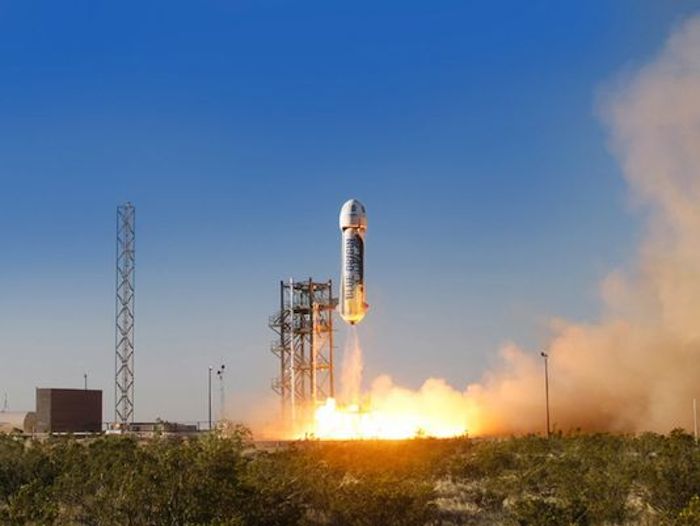.

The New Shepard space vehicle developed by Blue Origin blasts off on its first developmental test flight in Texas on April 29, 2015, marking another development in the commercial space race, Blue Origin was founded by Amazon CEO Jeff Bezos.
.
WASHINGTON — The GOP-led House voted Thursday to pass a bill that would extend important legal protections to aerospace firms for the next decade while exempting the firms from certain rules.
Republicans said the Spurring Private Aerospace Competitiveness and Entrepreneurship (SPACE) Act would properly prolong the "learning period" for the still-maturing commercial space industry as it makes key strides in getting people and goods into space.
Most Democrats opposed the measure, saying it would compromise safety and leave taxpayers on the hook if disaster strikes.
It was a rare moment of partisan friction over an industry that both parties have celebrated for its recent accomplishments, including satellite launches, space tourism ventures and cargo delivery to the International Space Station.
The bill passed 284-133 largely along party lines. It now heads to the Senate, which is considering a bipartisan bill to extend protections for the industry only through 2020.
Republicans characterized the SPACE Act, which builds upon earlier laws, as a mechanism for nurturing America's entrepreneurial spirit in a field with limitless potential.
"Right now, there's a new generation of pioneers," House Majority Leader Kevin McCarthy of California, the bill's chief sponsor, said before Thursday's vote. "They want to embark on the next stage of space exploration and we should not hold them back. Truth is, Washington never comes up with the next big idea. But we can support those innovators who do, and create the best environment for them to succeed."
The bill was backed by the commercial space industry's major players, including SpaceX, Virgin Galactic and the Commercial Spaceflight Federation, a trade group representing aerospace companies.
Maryland Rep. Donna Edwards, the top Democrat on the House space subcommittee, said the measure is essentially a sop to an industry that's been around long enough not to need all the bill's protections.
One provision, which would extend until 2025 a moratorium on the industry's compliance with certain Federal Aviation Administration rules, would give aerospace firms little incentive to quickly develop safety standards, she said. Additionally, she said, extending indemnification protections to 2025 might mean taxpayers would have to make good on liability claims in the event of a major accident.
"It's up to Congress to develop responsible policies that both encourage the commercial space industry and protect those who participate as the users of industry's services and activities," Edwards said. "Sadly, this bill just doesn't measure up to that responsibility."
Texas GOP Rep. Lamar Smith, who chairs the House Science, Space and Technology Committee, said extending liability protections for aerospace companies would keep the companies from conducting launches for other countries offering more favorable rules. He said the federal government has never had to cover claims related to accidents in the commercial space industry, despite years of indemnification protection.
Democrats questioned why Republicans are so determined to help the industry, given that the House Appropriations Committee voted Wednesday to approve a fiscal 2016 spending bill that would cut nearly $250 million from the $1.24 billion NASA is seeking for the program to replace the space shuttle.
The Commercial Crew program funds development of private rockets by SpaceX and Boeing to take astronauts to the space station. NASA is warning that anything less than its full request would delay the first launch to the orbiting lab until at least 2018, forcing taxpayers to keep paying Russia about $76 million every time a Soyuz roket takes an astronaut to the space station.
Quelle: USA Today
4314 Views
